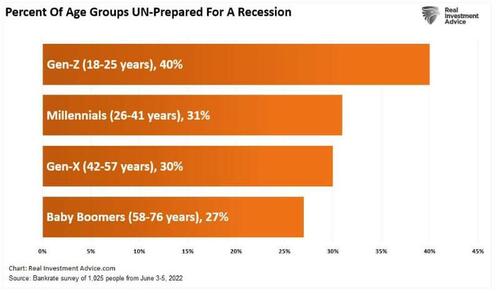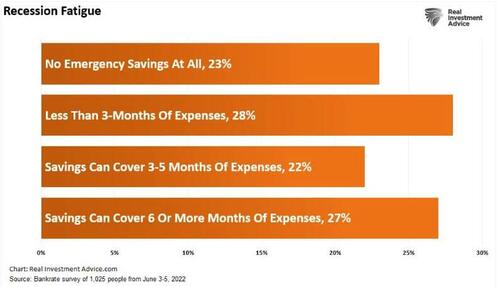"Recession Fatigue" Looms As Consumers Begin To Break
Oct 21, 2022 9:51:41 GMT -5
Post by Midnight on Oct 21, 2022 9:51:41 GMT -5
"Recession Fatigue" Looms As Consumers Begin To Break
FRIDAY, OCT 21, 2022 - 08:45 AM
Authored by Lance Roberts via RealInvestmentAdvice.com,
“Recession Fatigue” is setting in as consumers struggle under rising interest rates, high inflation, and a declining stock market. Such was a point made in a recent CNBC article:
“As the Federal Reserve aggressively raises rates to combat persistent inflation, the tough stance could come at a price. Already, falling stock markets have wiped out more than $9 trillion in wealth from U.S. households.
Fed Chairman Jerome Powell also warned the central bank’s upcoming moves to fight soaring prices may cause “some pain” ahead.
And yet, 31% of Americans said they are not equipped for an economic downturn and are not actively doing anything to better prepare for one, according to a recent Bankrate.com report.”
Interestingly, while individuals continue to suffer from “Recession Fatigue,” the economy is technically not in a recession. At least not yet, as the National Bureau of Economic Research (NBER), the official arbiter of recession dating, has not made that assessment. With unemployment rates at record lows, jobless claims at historically low levels, and consumer spending still above trend, an official recession likely has not yet begun.
However, don’t ask the average American that question. According to that Bankrate.com report, the average American has an entirely different view.
“Recession depression, recession fatigue, whatever you want to call it, the hits to Americans’ financial security keep coming. First, it was the devastating coronavirus pandemic, followed by 40-year-high inflation, and now the growing risk of another downturn. Sustaining motivation for two-plus years to prepare for tough economic times can no doubt feel exhausting.” – Bankrate.com analyst Sarah Foster.
When broken down by generation, younger adults, or Gen Zers, are more likely to experience “recession fatigue” than millennials, Gen Xers, and baby boomers. In the report, “recession fatigue” is primarily afflicting younger generations, leaving them unprepared to face a recession. Such data certainly flies in the face of media reports of households having “strong financial balance sheets.”

As we have discussed, households remain woefully short on savings despite a booming stock market over the last 12 years and $5 trillion in fiscal stimulus.

If “recession fatigue” is a problem now, it will worsen when unemployment increases.
The Great Termination
In 2020-2021, as the Government sent checks directly to households and companies forced older workers into early retirement, it became known as the “Great Resignation.” Naturally, that all worked well until inflation surged to the highest level in forty years, and all those that opted for “retirement” began looking for work to make ends meet.
Now, as the economy begins to slow, and individuals are already struggling with “recession fatigue” just trying to pay bills, the “Great Termination” is coming. Such is evident from a recent KPMG survey of C-Suite executives ringing alarm bells of a looming recession.
“Nine in ten CEOs in the U.S. (91%) believe a recession will arrive in the coming 12 months, while 86% of CEOs globally feel the same way, according to the international audit, tax, and advisory firm findings.
In America, half of the CEOs (51%) say they’re considering workforce reductions during the next six months — and in the global survey overall, eight in ten CEOs say the same.
It is “likely” and/or “extremely likely” that remote workers will be laid off first, according to a majority (60%) of 3,000 managers polled by beautiful.ai, a presentation software provider. Another 20% were undecided, and the remaining 20% said it wasn’t likely.” –MarketWatch
That sentiment is not surprising, given the symbiotic relationship between consumers and corporations. As shown, there is a high correlation between consumer sentiment and CEO confidence. Corporate revenues get derived from consumer demand. Therefore, when consumers contract spending due to “recession fatigue,” corporations take defensive actions to protect profitability.
Continued at link
FRIDAY, OCT 21, 2022 - 08:45 AM
Authored by Lance Roberts via RealInvestmentAdvice.com,
“Recession Fatigue” is setting in as consumers struggle under rising interest rates, high inflation, and a declining stock market. Such was a point made in a recent CNBC article:
“As the Federal Reserve aggressively raises rates to combat persistent inflation, the tough stance could come at a price. Already, falling stock markets have wiped out more than $9 trillion in wealth from U.S. households.
Fed Chairman Jerome Powell also warned the central bank’s upcoming moves to fight soaring prices may cause “some pain” ahead.
And yet, 31% of Americans said they are not equipped for an economic downturn and are not actively doing anything to better prepare for one, according to a recent Bankrate.com report.”
Interestingly, while individuals continue to suffer from “Recession Fatigue,” the economy is technically not in a recession. At least not yet, as the National Bureau of Economic Research (NBER), the official arbiter of recession dating, has not made that assessment. With unemployment rates at record lows, jobless claims at historically low levels, and consumer spending still above trend, an official recession likely has not yet begun.
However, don’t ask the average American that question. According to that Bankrate.com report, the average American has an entirely different view.
“Recession depression, recession fatigue, whatever you want to call it, the hits to Americans’ financial security keep coming. First, it was the devastating coronavirus pandemic, followed by 40-year-high inflation, and now the growing risk of another downturn. Sustaining motivation for two-plus years to prepare for tough economic times can no doubt feel exhausting.” – Bankrate.com analyst Sarah Foster.
When broken down by generation, younger adults, or Gen Zers, are more likely to experience “recession fatigue” than millennials, Gen Xers, and baby boomers. In the report, “recession fatigue” is primarily afflicting younger generations, leaving them unprepared to face a recession. Such data certainly flies in the face of media reports of households having “strong financial balance sheets.”

As we have discussed, households remain woefully short on savings despite a booming stock market over the last 12 years and $5 trillion in fiscal stimulus.

If “recession fatigue” is a problem now, it will worsen when unemployment increases.
The Great Termination
In 2020-2021, as the Government sent checks directly to households and companies forced older workers into early retirement, it became known as the “Great Resignation.” Naturally, that all worked well until inflation surged to the highest level in forty years, and all those that opted for “retirement” began looking for work to make ends meet.
Now, as the economy begins to slow, and individuals are already struggling with “recession fatigue” just trying to pay bills, the “Great Termination” is coming. Such is evident from a recent KPMG survey of C-Suite executives ringing alarm bells of a looming recession.
“Nine in ten CEOs in the U.S. (91%) believe a recession will arrive in the coming 12 months, while 86% of CEOs globally feel the same way, according to the international audit, tax, and advisory firm findings.
In America, half of the CEOs (51%) say they’re considering workforce reductions during the next six months — and in the global survey overall, eight in ten CEOs say the same.
It is “likely” and/or “extremely likely” that remote workers will be laid off first, according to a majority (60%) of 3,000 managers polled by beautiful.ai, a presentation software provider. Another 20% were undecided, and the remaining 20% said it wasn’t likely.” –MarketWatch
That sentiment is not surprising, given the symbiotic relationship between consumers and corporations. As shown, there is a high correlation between consumer sentiment and CEO confidence. Corporate revenues get derived from consumer demand. Therefore, when consumers contract spending due to “recession fatigue,” corporations take defensive actions to protect profitability.
Continued at link


